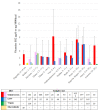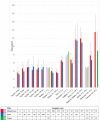Risk Assessment of Micronutrients Deficiency in Vegetarian or Vegan Children: Not So Obvious
- PMID: 37432244
- PMCID: PMC10180846
- DOI: 10.3390/nu15092129
Risk Assessment of Micronutrients Deficiency in Vegetarian or Vegan Children: Not So Obvious
Abstract
Vegetarian diets have gained in popularity worldwide and therefore an increasing number of children may be exposed to the resulting nutritional consequences. Among them, the risk of micronutrient shortfall is particularly of concern. This narrative review aims to assess and discuss the relevance of micronutrient deficiency risk based on the available data. It mainly draws attention to iron, zinc, iodine, and vitamins B12 and D intake. Diets that are more restrictive in animal source foods, such as vegan diets, have a greater likelihood of nutritional deficiencies. However, the actual risk of micronutrient deficiency in vegetarian children is relatively difficult to assert based on the limitations of evidence due to the lack of well-designed studies. The risk of vitamin B12 deficiency must be considered in newborns from vegan or macrobiotic mothers and children with the most restrictive diet, as well as the risk of iron, zinc, and iodine deficiency, possibly by performing the appropriate tests. A lacto-ovo-vegetarian diet exposes a low risk if it uses a very varied diet with a sufficient intake of dairy products. Vegan and macrobiotic diets should be avoided during pregnancy and childhood. There is a need for education and nutrition guidance and the need for supplementation should be assessed individually.
Keywords: children; infants; macrobiotic; vegan; vegetarian.
Conflict of interest statement
The author declares no conflict of interest.
Figures



Similar articles
-
A cross-sectional study of nutritional status in healthy, young, physically-active German omnivores, vegetarians and vegans reveals adequate vitamin B12 status in supplemented vegans.Ann Med. 2023;55(2):2269969. doi: 10.1080/07853890.2023.2269969. Epub 2023 Oct 18. Ann Med. 2023. PMID: 37851870 Free PMC article.
-
Micronutrient status and intake in omnivores, vegetarians and vegans in Switzerland.Eur J Nutr. 2017 Feb;56(1):283-293. doi: 10.1007/s00394-015-1079-7. Epub 2015 Oct 26. Eur J Nutr. 2017. PMID: 26502280
-
Micronutrient intake and status in young vegans, lacto-ovo-vegetarians, pescatarians, flexitarians, and omnivores.Eur J Nutr. 2024 Oct;63(7):2725-2741. doi: 10.1007/s00394-024-03453-4. Epub 2024 Jul 18. Eur J Nutr. 2024. PMID: 39026105 Free PMC article.
-
Vegetarian diets and diets which restrict animal-source foods during childhood in high-income countries.Paediatr Int Child Health. 2023 Nov;43(4):57-82. doi: 10.1080/20469047.2023.2245186. Epub 2023 Aug 31. Paediatr Int Child Health. 2023. PMID: 37649436 Review.
-
Systematic review and meta-analysis of iodine nutrition in modern vegan and vegetarian diets.Br J Nutr. 2023 Nov 14;130(9):1580-1594. doi: 10.1017/S000711452300051X. Epub 2023 Mar 13. Br J Nutr. 2023. PMID: 36912094 Free PMC article. Review.
Cited by
-
Association between provegetarian food patterns and micronutrient adequacy in preschoolers: the SENDO project.Eur J Pediatr. 2024 Dec;183(12):5267-5278. doi: 10.1007/s00431-024-05808-9. Epub 2024 Oct 7. Eur J Pediatr. 2024. PMID: 39373794 Free PMC article.
-
Optimization of Cyanocobalamin (Vitamin B12) Sorption onto Mesoporous Superparamagnetic Iron Oxide Nanoparticles.Molecules. 2024 May 1;29(9):2094. doi: 10.3390/molecules29092094. Molecules. 2024. PMID: 38731585 Free PMC article.
References
-
- World Health Organization Micronutrients. Geneva. 2022. [(accessed on 6 December 2022)]. Available online: https://www.who.int/health-topics/micronutrients#tab=tab_1.
-
- Black R.E., Victora C.G., Walker S.P., Bhutta Z.A., Christian P., de Onis M., Ezzati M., Grantham-McGregor S., Katz J., Martorell R., et al. Maternal and Child Nutrition Study Group. Maternal and child undernutrition and overweight in low-income and middle-income countries. Lancet. 2013;382:427–451. doi: 10.1016/S0140-6736(13)60937-X. Erratum in Lancet 2013, 382, 396. - DOI - PubMed
Publication types
MeSH terms
Substances
Grants and funding
LinkOut - more resources
Full Text Sources
Medical

